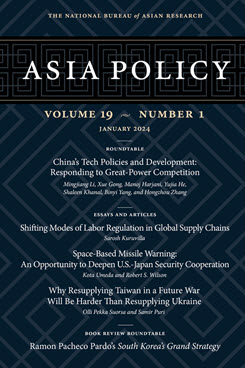Article in Asia Policy 19.1
“Professionals Talk Logistics”
Why Resupplying Taiwan in a Future War Will Be Harder Than Resupplying Ukraine
This article compares the logistical challenges associated with the West’s military resupply of Ukraine and those of resupplying Taiwan in a potential future conflict.
Executive Summary
MAIN ARGUMENT
Despite facing critical munitions shortages and growing political divisiveness over the substantial financial burden of this policy, the West’s resupply of the Ukrainian military during Ukraine’s current war with Russia has—so far—been a success, keeping forces battle-worthy and able to continue fighting after nearly two years of high-intensity conventional warfare. Would the resupply of Taiwan against China in wartime be similarly feasible for the U.S. and its regional partners in the Pacific? Major obstacles distinguish the Taiwan scenario. In prioritizing planning for a Taiwan contingency, the U.S. government should consider five major logistical factors: geopolitical ambiguity, the tyranny of distance, the need to resupply by air and sea, the involvement of reliable regional partners, and China’s tolerance for the supply of armament to Taiwan in wartime.
POLICY IMPLICATIONS
- Pre-positioning war materiel forward on allied soil is crucial to enable a rapid response to any military aggression against Taiwan. Besides increasing stocks of arms and ammunition in Taiwan itself, materiel should be pre-positioned with short reach to Taiwan in Japan, South Korea, and the Philippines and closely linked with depots in Guam, Hawaii, Australia, and the continental U.S. in a hub-and-spoke framework.
- To assist Taiwan in establishing reserves of arms and munitions, the U.S. should increase technology transfer and joint production of critical war materiel with and in Taiwan. Boosting Taiwan’s own defense industry base will help ensure the security of supply and an independent maintenance, repair, and overhaul capability in a conflict. Moreover, to ensure the materiel survives, hardening, decentralization, and the ability to disperse at least parts of the industrial production and maintenance, repair, and overhaul capability should be advanced.
- In a war across the Taiwan Strait, Taiwanese ports and airports would come under attack early on, and even if they were not destroyed, the People’s Liberation Army would try to block access to them, hindering resupply efforts. Strong emphasis should be placed on the development of robust amphibious and civilian roll-on/roll-off capabilities, buildup of temporary piers, and improvement of Taiwan’s transportation infrastructure.
Olli Pekka Suorsa is an Assistant Professor at Rabdan Academy (United Arab Emirates). Previously, he was a research fellow in the Maritime Security Programme of the S. Rajaratnam School of International Studies (RSIS) in Singapore. Prior to his academic career, Dr. Suorsa worked in the defense and aerospace industry in Finland.
Samir Puri is a Visiting Lecturer in War Studies at King’s College London and Associate Fellow at Chatham House (United Kingdom). Between 2020 and 2022, he was a senior fellow at the International Institute for Strategic Studies Asia (IISS–Asia) in Singapore. In 2014–15, Dr. Puri served as a ceasefire monitor in the Donbas region of eastern Ukraine during Russia’s first invasion of the country.
About Asia Policy
Asia Policy is a peer-reviewed scholarly journal presenting policy-relevant academic research on the Asia-Pacific that draws clear and concise conclusions useful to today’s policymakers. Asia Policy is published quarterly in January, April, July, and October and accepts submissions on a rolling basis. Learn more


